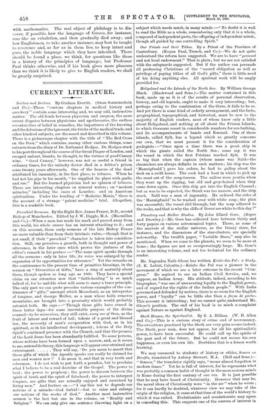Heligoland and the Islands of the North Sea. By William
George Black. (Blackwood and Sons.)—The matter contained in this book, made up as it is of the results of personal observation, history, and old legends, ought to make it very interesting ; but, perhaps owing to the combination of the three, it fails to be so. And yet there is some kind of orderly arrangement, and the facts, geographical, topographical, and historical, must be new to the majority of English readers, most of whom know only a little about Heligoland, and nothing at all about the Frisian Islands, to which Germans resort in considerable numbers for sea-bathing, and its accompaniments of bands and Kursaal. One of these islands, called Sylt, has a legend which so greatly concerns our own, that we must present it for the consideration of geologists :—"Once upon a time there was a great ship in which the giants sailed the North Sea ; some say it was the vessel in which the first Frisians reached Sylt. It was so big that when the captain (whose name was Nald,--the chroniclers are always definite in such matters ; his ship was the Mannigfuald') gave his orders, he had to gallop about the deck on a swift horse. The cook had a boat in which to pick up the meat out of the soup-tureen. The sailors were youths when they went up the rigging, but old and grey-haired when they came down again. Once this ship got into the English Channel ; but as was to be expected, the Strait was too narrow, and the ship stuck. Nald was a man of ingenuity. He ordered the sides of the llannigfuald' to be washed over with white soap ; the plan was successful; the vessel slid through, but the soap adhered to the rocks, and that is why the cliffs of Dover are white to this day !"


















































 Previous page
Previous page